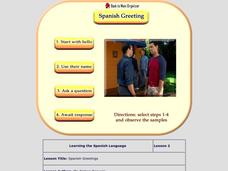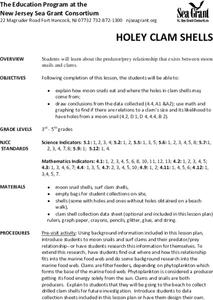Northeastern Educational Television of Ohio, Inc.
Feudalism Research
Working with a partner, young historians research different feudal roles in medieval Europe (i.e. nobles, knights, clergy, tradesmen, and peasants), create a fact sheet about their assigned roles, and present their findings to the class.
Curated OER
Surviving in Our Ecosystems
Third graders investigate the balance of ecosystems and how each species has different survival needs. They research on the internet using the site included. They then participate in activities/centers utilizing the facts they discovered.
Curated OER
Organ Systems
Students examine organisms that are composed of tissues, organs, and systems. They dissect a fetal pig and explore the assigned organs systems such as the skeletal, muscular, and circulatory organs. Students identify and explain their...
Curated OER
Lesson 2- Spanish Greeting
Break down a quick conversation in Spanish. After the teacher presents the vocabulary, the class heads to the computer lab, where class members can watch a brief interactive video. The visual is one clip separated into four clearly...
Social Media Toolbox
Reporting with Social Media
What does it take to create news stories that are both informative and objective? Aspiring journalists walk the line between engagement and activism with activity 15 of a 16-part series titled The Social Media Toolbox. Grouped pupils...
Curated OER
Erupting Volcano
Fourth graders watch teacher conduct the following experiment. Wearing safety goggles and old clothing is advised. The experiment could ruin clothing and hurt unprotected eyes. Follow the steps below having students write down what they...
Curated OER
Line and Description
Fifth graders, in order to explore different forms of poems, are introduced to line breaks and description through "The Pickerel" guided visualization.
Curated OER
Where Do We Get the Money We Spend?
Students discuss the sources of income for people in their community. They examine why different jobs are paid different wages. They also classify productive resources in the economy.
Curated OER
New Year Celebrations
Young scholars study the universality of many New Year celebrations. They present traditions associated with New Year celebrations and explain why New Year is at different times for different people.
Curated OER
Design Motifs and Eggs
Pupils create an Easter egg that displays at least one secondary color, one primary color, and one motif of design.
Curated OER
My Favorite Meal
Students investigate ecological systems and the multiple uses of the environment by studying the osprey population.
Curated OER
A Money Plan
Middle schoolers discuss what a budget is and its purpose. They create a draft of a simple budget that they could possible use. They discuss their trade-offs when they choose to follow a budget.
Curated OER
It's Okay to Exhale: Photosynthesis and Cellular Respiration
Students will observe the differences between photosynthesis and cellular respiration. Then they observe the links due to climate changes and relate how climate change affects their lives.
Curated OER
Relationships and Biodiversity
Students examine diversity on the planet and the differences within a species. In this investigative lesson students complete a lab that allows students to better understand the relatedness between plants.
Curated OER
Making Embryo Sets
Students preserve embryos to study embryonic development from day 3 through 21.
Curated OER
Holey Clamshells
Students analyze data to make hypotheses and conclusions regarding the predator/prey relationship between moon snail and surf clams.
Curated OER
Energy Flow in Ecosystems
Middle schoolers, in groups, create a slide show about the ecosystem and answer critical thinking questions based on their research.
Curated OER
Connect the Species
Fourth graders, in pairs, explore energy transfer and species interrelationships by viewing slides on a microscope. hey explore phytoplankton (producers) and zooplankton (consumers)
Curated OER
What Makes up an Ecosystem?
Eighth graders design posters of working ecosystems using pictures from magazines. They label autotrophic, heterotropic, or saprotrophic energy sources, and identify predators and prey.
University of South Carolina
Home Sweet Home
Fifth graders will research a biome (land or aquatic) and create a project (diorama, model or another idea of the student's choosing) which includes the geographic features of that biome as well as plants and animals found there and...
Curated OER
Finding Caterpillars
Young scholars examine how animals protect themselves from predators and camouflage themselves. They participate in a simulation in which they locate red and green yarn "caterpillars," organize their data, and generate a bar graph using...
Curated OER
Mock Fly-Tying
Students make their own fly-fishing flies. In this aquatic macroinvertebrates lesson, students look at images of different species of aquatic macroinvertebrates. Students compare the similarities and differences among the...
Curated OER
Limu in Your Lunch
Young scholars explore various types of algae found in Hawaii. For this science lesson, students research species of the three types of limu and identify various uses. Young scholars explore products that contain limu.























